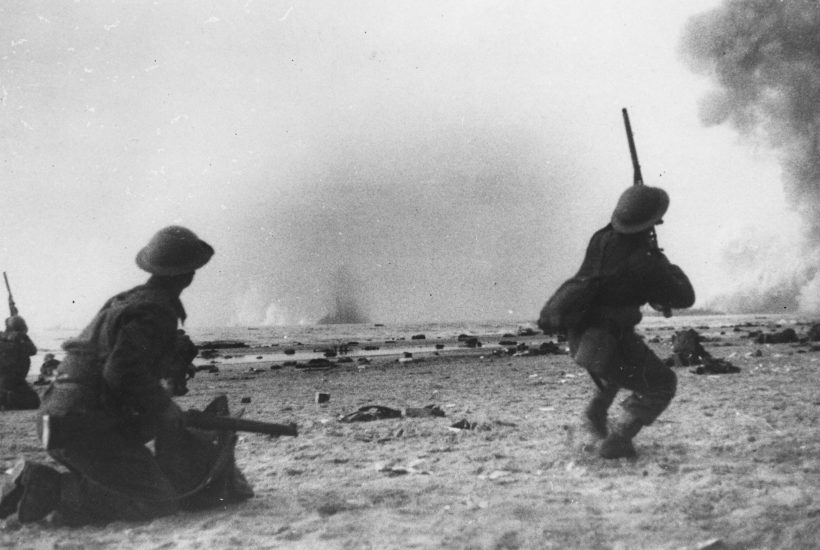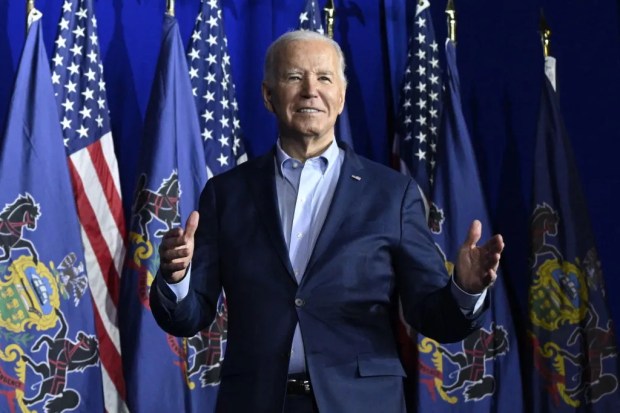Below is The Spectator’s leading article from Christmas 1940, which you can find on our fully-digitised archive.
We have reached the second Christmas of the war, and we are keeping it with what heart we may. No confidence in the rightness of our cause is lacking, nor has doubt emerged about the ultimate issue of the struggle. What penetrates men’s souls today is not concern for their personal fate, or even for their country’s, but a sense, borne in on them with sombre force as this festival comes round, of the tragedy of the conflict in which millions of human beings are still locked on the day when the message of peace and good will to all mankind should be sounding from every pulpit and rung out by the bells of every steeple.
All that is part of the eternal problem of evil, taking immense and terrible shape before our eyes. We can no more profess to plumb the mystery of it than generations of thinkers in the past who have admitted that when all is said there remains a residuum of mystery still. But evil in the world comes of evil men and evil deeds, and we have no choice but to be resisting that evil today.
We entered the war sixteen months ago with consciences clear, and except that our efforts have been too slack we have little to reproach ourselves with as we survey its course from September of last year till today. We fought to further no national ambition and pursuing no interest but that of self-protection. We have sacrificed much in the endeavour to defend weaker nations, and if we did not succeed in that their cause remains ours still and their restoration to freedom and independence will be a basic condition of the final settlement. Our war aims may not have been formulated in detail, but the principles we are fighting for are plain to all, and there is no item or aspect of them that discredits us.
Evil in the world comes of evil men and evil deeds, and we have no choice but to be resisting that evil today
This Christmas finds us in a different temper from last. The war, and our part in it, has since then undergone a catastrophic change. Then, as we see well now, we were living on illusions. France stood to all appearance unshaken. Her faith in her Maginot Line was generally shared here, and her army was held to be of finer quality than any in Europe, except perhaps our own relatively small force. The threats against the Low Countries in November had not materialised, and an unjustified confidence in the power of Belgium and Holland to defend themselves in case of need prevailed. For four months more, in spite of the fate of Norway, we lived in that fools’ paradise.
Then came the debacle of May and June, and the British Commonwealth was left, in the darkest hours it has ever passed through, to face the might of Germany, and whatever might Germany’s jackal ally disposed of, alone. Dark as that hour was, we have survived it, and the change from June to December has been hardly less arresting than the change from January to June.
In 1918 the prospect that Germany might secure the Channel ports seemed the supreme and irremediable disaster. She has held them now, and the Norwegian and Danish and Dutch and Belgian ports as well, for six months, and our shores still remain inviolate except by air-attack and a few spasmodic shells discharged now and then as a tour de force across the Straits of Dover. Our seaborne commerce continues, in spite of the concentrated U-boat menace, on a scale sufficient to supply our vital needs and to help to pay for part at least of the tremendous purchases we are forced to make abroad. Our population has withstood air-attack on a scale unprecedented in history, and bitter though its sufferings have been and are and will be, not Hitler himself can believe that this island can be conquered through its spirit being broken.
As we keep our war-time Christmas, and survey with sober fortitude the chances that the coming year may bring, we can take stock of our position without misgiving. As the Prime Minister said in the House of Commons last week, ‘some sense of composure and even satisfaction’ is justified, though the dangers that still impend are so obvious and so grave as to dispel all temptation to undue optimism. That sense of composure rests on certain solid and reassuring facts – the almost incredible rescue of those 330,000 men from Dunkirk; the failure of Hitler to deal an effective stroke at the moment when all our plans were shattered by the defection of France; the defeat of the mass air-attack, and the frustration so far of all invasion projects; the heroic resistance of our cities in face of the night-bomber; the industrial achievements of the Dominions and India, and America’s inspiring and materially invaluable recognition of our needs and resolve to supply them regardless of the cost; the heroic reaction of Greece against a peculiarly foul aggression, and the staggering blows that have been rained on Italy by that gallant people and by the triple British force in and off and over Libya. If the disasters that had fallen on the Allied cause by June were beyond expectation, so equally was the recovery that has been effected by December.
But we must recognise how critical is the situation still. The promise of help from America is of such cardinal importance that if it comes in time it may properly be looked on as the guarantee of victory. But it is a race with time still.
The enemy was always ruthless, and he is now made desperate by circumstance. He can subdue a continent country by country, but he cannot hold it down indefinitely. He cannot be indifferent to the fate of Italy, for though nothing but a contemptuous view of her prowess was even taken at Berlin, she obviously had a role to play in diverting British forces, which could ill be spared from the Western theatre, to the Eastern Mediterranean. Now that there is a prospect of those forces, or part of them, being released by Italy’s collapse, the need for Hitler to strike a blow before that happens is manifest.
It can hardly fall anywhere except on this island. Whatever trust he may put in his submarine war on our shipping, that is a weapon which yields too slow results. Before he could reduce us that way, if he ever could, American aeroplanes, American munitions, American ships, added to the always expanding output of our own factories and shipyards, would have given us a predominance that must prove decisive.
For that reason the theory that another attempt at invasion is imminent must be taken seriously. The season and the prevailing weather make it unlikely that the attempt will be by sea. Conditions, indeed, for an assault based on air-attack, with troops dropped from parachutes and reinforced by troop-carriers, are hardly less unfavourable. But the enemy no doubt counts on their being not less unfavourable for the defence, and in any case, if he feels the necessity for some action now this may be the only action open to him. If it is attempted we shall not be taken by surprise. There may be new ordeals to face, but thanks to the time we have had for developing our defences there is ground for believing them equal to any need.
There are other uncertainties of which we have to take account, chief among them the capacity of the weak and divided Vichy Government to resist the immense pressure applied to it by the Germane, who may be demanding already the passage of German troops en route for Italy or Spain. Marshal Petain may yield, or his resistance may be brushed aside, and Germany occupy the south of France as she has occupied the north. That would create new problems for us in the Mediterranean, but not necessarily problems more insoluble than many that have been solved already.
There is much, moreover, in the picture that we cannot see. If we are most conscious of our own difficulties and dangers, Germany has to grapple with difficulties and dangers too. Our air-attack on her is inflicting more military injury than her air-attack on us. Our blockade is robbing her of indispensable necessities, despite her ruthless plunder of every country she has over-run. The freezing of the Danube cuts off her imports of oil, and the freezing of the Gulf of Bothnia her imports of iron ore. Her shortage of foodstuffs grows more acute. There will be little happiness or confidence in Germany this Christmas. Our own effort and endurance may yet make it the last Christmas of the war.
Got something to add? Join the discussion and comment below.
Get 10 issues for just $10
Subscribe to The Spectator Australia today for the next 10 magazine issues, plus full online access, for just $10.



















Comments
Don't miss out
Join the conversation with other Spectator Australia readers. Subscribe to leave a comment.
SUBSCRIBEAlready a subscriber? Log in